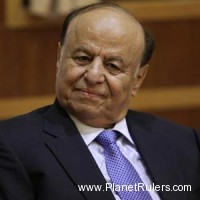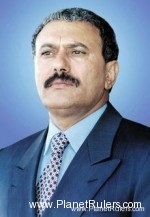Abd Rabbuh Mansur Al-Hadi, President of Yemen (Elected on Feb 21, 2012)
 Field Marshal Abd Rabbuh Mansur Al-Hadi (Arabic: عبد ربه منصور الهادي; born 1 September 1945) is a Yemeni politician who is the President of Yemen since 27 February 2012. He was previously the Vice President from 1994 to 2012. Between 4 June and 23 September 2011, he was the Acting President of Yemen while Ali Abdullah Saleh was undergoing medical treatment in Saudi Arabia following an attack on the presidential palace during the 2011 Yemeni uprising. Then, on 23 November, Al-Hadi became Acting President again, after Saleh moved into a non-active role pending the presidential election “in return for immunity from prosecution.” Al-Hadi was “expected to form a national unity government and also call for early presidential elections within 90 days” while Saleh continued to serve as President in name only.
Field Marshal Abd Rabbuh Mansur Al-Hadi (Arabic: عبد ربه منصور الهادي; born 1 September 1945) is a Yemeni politician who is the President of Yemen since 27 February 2012. He was previously the Vice President from 1994 to 2012. Between 4 June and 23 September 2011, he was the Acting President of Yemen while Ali Abdullah Saleh was undergoing medical treatment in Saudi Arabia following an attack on the presidential palace during the 2011 Yemeni uprising. Then, on 23 November, Al-Hadi became Acting President again, after Saleh moved into a non-active role pending the presidential election “in return for immunity from prosecution.” Al-Hadi was “expected to form a national unity government and also call for early presidential elections within 90 days” while Saleh continued to serve as President in name only.
Hadi was born in 1945, in Thukain village in Abyan, a southern Yemeni governorate where armed men known as Ansar Al-Shariah have controlled the area since late May 2011. He graduated in 1966 after receiving a military scholarship to study in Britain, where he also learned to speak English. Then, in 1970, he received another military scholarship to study tanks in Egypt for six years. Hadi spent the following four years in Soviet Union studying military commanding. He occupied several military posts in the southern Yemen army until 1986, when he fled to Sana’a with Ali Nasser Mohamed, president of South Yemen at the time.
He became Vice President of Yemen after Ali Salim Al-Beidh resigned and lost the civil war. Al-Hadi was appointed by President Ali Abdullah Saleh as Vice President on 3 October 1994. Before his appointment as Vice President, he was briefly the Minister of Defense.
Hadi was the sole candidate in the presidential election that was held on 21 February 2012. His candidacy was backed by the ruling party as well as the parliamentary opposition. The Election Commission reported that 65 percent of registered voters in Yemen voted during the election. Abd Rabbuh Mansur Al-Hadi took the oath of office in Yemen’s parliament on 25 February 2012. He was formally elected as the president of Yemen on 27 February 2012, when Saleh resigned from the presidency and formally ceded power to Hadi.
From his early days at office, President Hadi advocated fighting Al-Qaida as an important goal. In a meeting with british foreign minister in his first days at office Hadi said “We intend to confront terrorism with full force and whatever the matter we will pursue it to the very last hiding place”.
Another security issue he is busy with is the Yemeni military which suffers form a sharp division, since Major General Ali Mohsen Saleh defected in late March 2011 in the midst of protests demanding Saleh’s ouster. The military services protests extended to the Republican Guard – based in the south of Sana’a – when dozens from the Fourth Brigade closed down southern entrances to the capital city and demanded the firing of the brigade’s commander, Mohammad Al-Arar, and his general staff
Ali Abdallah Salih, Former President of Yemen
1942: Born in Bayt al-Ahmar as a member of the Sanhan tribe of the Hashid tribe.
1958: Joins the army only 16 years old.
1962 September 26: Saleh leads a coup that replaces the Muslim monarchy of North Yemen with a civilian government.
1974: Saleh takes part in the coup that brings Ibrahim al-Hamdi to power as president.
1978 April: Assists the chairman of the Military Council, Ahmad Ghashmi in his crushing of a rebellion staged by rival officers. Saleh is appointed commander-in-chief of the army.— June: Ghashmi is assassinated, and Saleh is appointed chief of staff and member of the Presidential Council.
— July 17: Is elected president by 76 of the 96 members of the People’s Constituent Assembly.
— October An attempted coup by troops in the army is stopped.
1980: Saleh and the rebellious forces of the National Democratic Front (NDF) makes a deal about a national unity government with land reform and non-aligned foreign policy as the main political issues. Saleh would not keep his promise of inviting NDF into the government.
— August: After that Saudi Arabia had stopped their US$300 billion annual aid to Yemen, Saleh manages through a visit to get a partial resumption of the aid.
— October: Replaces Prime minister Ghani with Abdul Karim Iryani.
1981 October: Forms the General People’s Congress (GPC) with 1,000 members, most by appointment and the rest by indirect election. This would develop into a political party.
1983: Reelected as president. Saleh calls Ghani back as Prime minister.
1984: Signs a Friendship and Cooperation Treaty with the Soviet Union.
1988: Reelected as president.
1989: Brings North Yemen into the Arab Cooperation Council together with Egypt, Iraq and Jordan.
1990 May 22: North and South Yemen unites, with Saleh becoming the country’s president, while the president of South Yemen becomes Vice President.
1991: Following Yemen’s refusal to join the alliance against Iraq in the Gulf War, Saudi Arabia imposes heavy sanctions on Yemen, damaging the country’s economy.
1993: Saleh’s party, GPC, becomes the largest party in the parliament with 123 of 301 seats.
1994 May 5-July 7: Civil war between the south and north, which Saleh wins. The victory earned him great popularity in the areas of former North Yemen.
1999 September: The first direct elections for president gives Saleh 96% of the votes, but most of the opposition boycotts the election.


